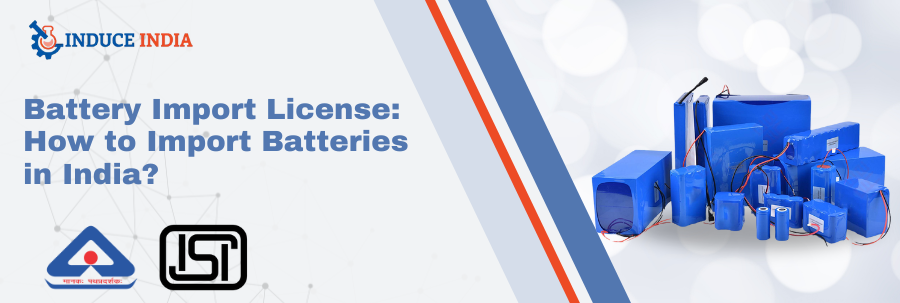If you are a manufacturer of batteries and want to achieve a Battery Importer license but don’t know where to start then we are here to tell you each step. So, let’s begin with the basics. The battery is specifically referred to as a device that is composed of multiple cells. These batteries are divided into different types. One is Primary Batteries which are designed to be used until exhaustion of energy then they are discarded.
Alkaline batteries and zinc batteries come under primary primary. Another is Secondary Batteries which refer to batteries that can recharged and its example is lead acid batteries. The lithium-ion battery is also a type of rechargeable battery. These batteries are used for batteries in vehicles, military purposes, aerospace applications, and more. Let’s understand how you can import batteries in India.
Explore the Rules For Import of Batteries in India
There are some general rules related to the import of batteries in India. Custom Duties mean batteries may subjected to customs duties and charges upon import. It is necessary to check current customs duty through the Indian Customs Department. You will need to provide proper documents for import that should include a commercial invoice, packing list, bill of entry, and more.
Batteries that contain hazardous materials like lead-acid or lithium-ion batteries may be subject to environmental regulations. Ensure compliance with environmental laws and regulations that also include recycling requirements and waste disposal.
There may be restrictions on importing certain types of batteries due to safety concerns. Batteries may need specific labeling and marking requirements that include voltage, capacity, and safety information. Follow guidelines for safe transportation and storage if they are classified as hazardous materials.
Which Batteries are Imported from India?
For starting power engines automotive batteries are used in vehicles, cars, trucks, and motorcycles. Industrial batteries are used in machinery, uninterruptable power supplies, telecommunications equipment, and more. These batteries generally included lead acid batteries and nickel-cadmium batteries. Renewable energy batteries are for energy storage solutions like solar or wind power.
Other are consumer batteries that are used for toys, flashlights, and portable devices. They are disposable and widely used by consumers. Marine batteries are used in boats, marine equipment, or vessels. Solar batteries, e-bike or e-scooter batteries, medical devices batteries that are used in medical equipment and devices, aviation batteries, and mobile phone batteries.
What is the process for obtaining a Battery Import License?
To achieve a BIS License for Importer/Exporter you have to follow some steps. The initial step is company registration. It means ensuring your business is registered in India and licensed for importing goods. Another step is obtaining an importer-exporter code. It means you need the importer-exporter code issued by the Directorate General of Foreign Trade. Then decide which customs port you’ll use for the import. This determines where your goods will enter India.
The next step is to determine the correct customs classification for your batteries. The customs value of goods is required to be accessed accurately. Check if your batteries require BIS certification and then ensure compliance with environmental rules and regulations. Meet labeling and packaging requirements that include safety information, voltage markings, recycle signs, and more. Check if your batteries require any specific import licenses from relevant authorities or not.
Make sure that all the necessary documents are prepared well and work with the clearing agent to facilitate the customs clearance process. Pay all the charges and taxes. Ensure proper storage and disposal of batteries and after the clearance of customs, you can distribute or sell your batteries in India.
For environmental compliance, documents that are needed for importing batteries are commercial invoices, the bill of entry, the packing list, the importer-exporter code, BIS certification, test reports, quality certificates, environmental compliance documents, digital signature certificate, customs duty and tax documents, and import license and permit. These steps can be completed easily with the help of a BIS consultant in India. Consultants can help you in each step and provide you with full details about Battery Import License.
What is the Process of Renewing your Battery Import License?
Your process of renewing the battery import license begins with preparing all the documents, visiting the DGFT website, logging in to the DGFT portal, then Go to IEC selection, Select the renewal option, filling out the renewal application, attach the required documents and then pay the renewal fee. Then submit the application and acknowledg and the processing step will take place. After verification and approval of DGFT, you can download the renewed IEC certificate.
Also Read – BIS Certification for Storage Battery
Conclusion
As a manufacturer and importer, you should be aware of the battery import license and make sure that all required steps are completed. Successful battery import enhances your demand in the market and helps you to grow in India with rules and regulations.



